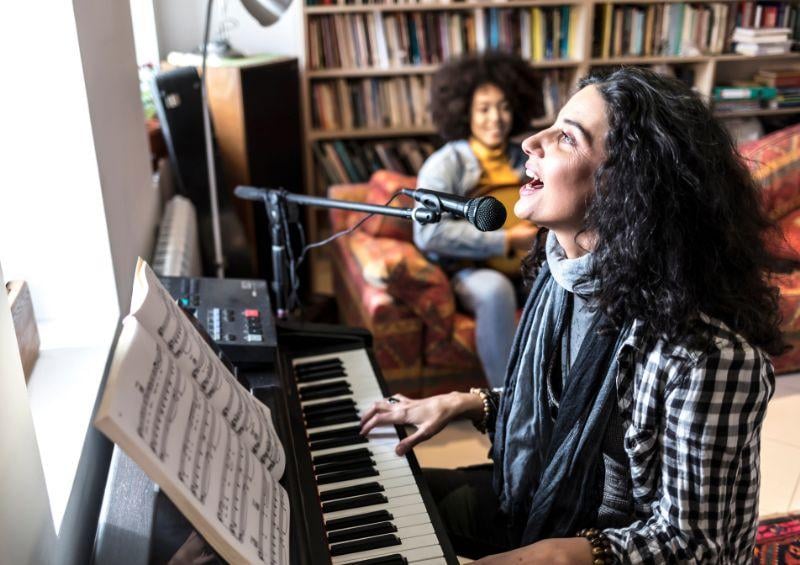Duluth, Georgia -
Duluth, GA based music school Atlanta Institute of Music and Media (AIMM) recently published a blog post, titled ‘How to Find Your Vocal Range.’ The Institute has established itself as one of the country’s leading providers of musical education, offering majors in a variety of music and media subjects, including but not limited to Music Technology, Music Performance and Recording Arts Technician, and they often share a wealth of information on the industry and more through their blog.
Atlanta Institute of Music and Media President Nite Driscoll states, “If you are aiming to be a singer, finding your vocal range is one of the most critical things you need to do. Learning your vocal range will also teach you more about your voice type, understand your weak spots, measure your progress in voice training and choose the right songs for your voice. As you grow and learn, if you want to expand your vocal range, knowing your current range serves as a starting point. This means that a knowledge of their vocal range is vital to any singer.”

As AIMM explains, a vocal range is the scope of notes (from the lowest note to the highest note) that an individual can comfortably sing in their chest voice. The notes in one’s vocal range have to be fully projected and not sung in falsetto or their head voice. There are different vocal ranges, and they are also described as vocal types: soprano, alto, tenor, baritone and bass.
The center of a vocal range is the tessitura. This is the set of notes that a singer can reliably project following a vocal warm-up, and they should be able to confidently belt this set. While vocalists may feel comfortable singing notably low or high notes within their range, if they cannot belt them out at maximum volume, it means that they are not within their tessitura or typical range.
According to Atlanta Institute of Music and Media, the best reason for anyone to know their vocal range is so they can pick the type of songs that fit their voice. For instance, people with a lower range can easily emulate Johnny Cash. Those with a higher range might relate to Beyonce or Freddie Mercury. Anyone in the middle might be able to perform Billie Eilish’s songs. Being able to choose the right song to sing will do wonders for an aspiring singer’s career.
To find a vocal range, AIMM says anyone concerned should begin by identifying the lowest note they can sing. The blog post explains further, saying “Find middle C (C4) on the piano and sing a consistent vowel sound like ‘ah,’ ‘ee’ or ‘oo,’ matching your voice to the C4 note. Now, go down all white keys and sing to each note until you reach the lowest recognizable pitch you can sustain. The last note you can sing comfortably without croaking or breathing is your low note.” The same process done in reverse will help establish the singer’s highest note, and their vocal range is what is between their lowest note and their highest note. More information can be found on AIMM's blog.
For those who are passionate about singing and want to pursue a career in the industry, knowing their vocal range is just the start. If they want to be on the fast track to becoming a professional and well-compensated singer, they should think about attending an accredited music college — such as Atlanta Institute of Music and Media.
AIMM has two programs with a vocal concentration that will help aspiring singers expand their range, perfect their pitch and completely master their singing abilities. Atlanta Institute of Music and Media also offers additional degrees, such as the Music and Technology Associate Degree: Vocal Concentration, which can give singers an additional skill boost by teaching them how to track, mix and master music.
Those who want to learn more about Atlanta Institute of Music and Media and the variety of programs on offer can find more information on their website. The Institute encourages interested parties to get in touch with Nite Driscoll or another member of the team directly via email or phone. Further, Atlanta Institute of Music and Media can also be reached through the contact form on their website. They also have a Facebook page where they post updates and share additional information and communicate with the community.
Atlanta Institute of Music and Media has a uniquely effective approach to vocational training for musicians, production, and audio engineering students.
2875 Breckinridge Blvd #700,
Duluth, Georgia 30096
July 08, 2024 – AIMM Unveils Blog Detailing How Streaming Changed The Music Industry
June 04, 2024 – AIMM Unveils - The Evolution Of Electric Guitar: A Journey Through Music's Iconic Instrument
May 03, 2024 – AIMM Unveils Guide - How To Sing Into A Microphone, Elevating Vocal Performance Skills
April 19, 2024 – AIMM: Unveils Everything About The ELVIS Act, Safeguarding Artists in the Digital Age
March 06, 2024 – Aimm: Pioneering Music Compositions With AI, Creating New Opportunities for Musicians
February 15, 2024 – Aimm: Unveils The Perks Of Enrolling In An Online Music School
January 10, 2024 – Georgia Music School, AIMM: Does AI Threaten Musicians?
November 02, 2023 – AIMM Offers Tips On How To Hit High Notes
August 24, 2023 – Atlanta Institute of Music and Media Unveils Game-Changing Online Degree in Music Production and Audio for Media
July 19, 2023 – Atlanta Institute of Music and Media Opens to the Public for an Exhilarating Summer Open House